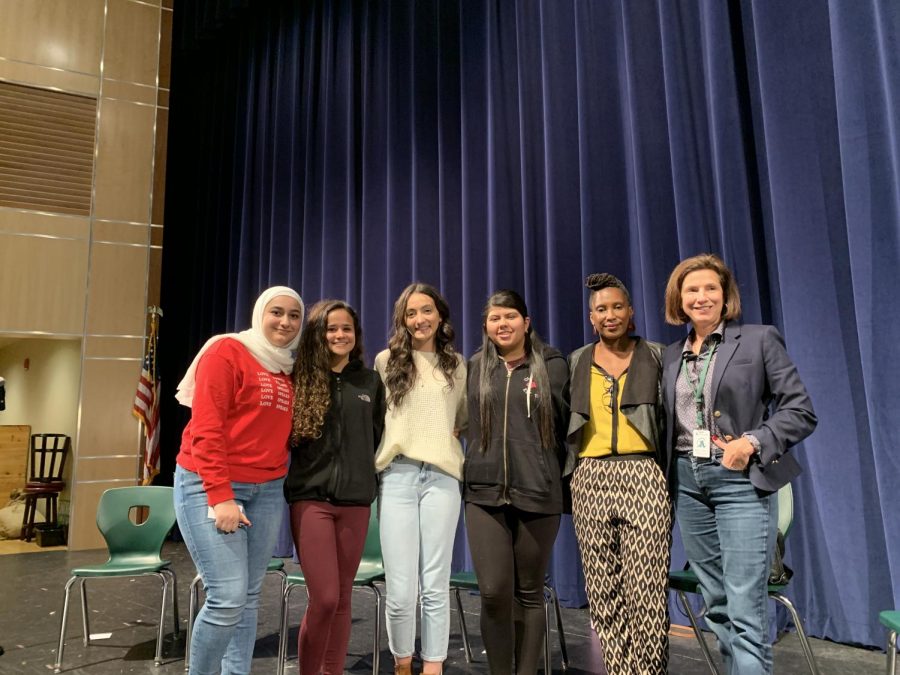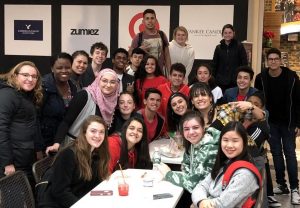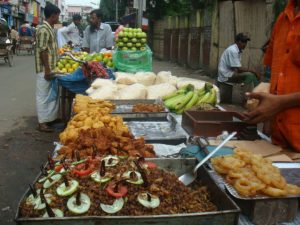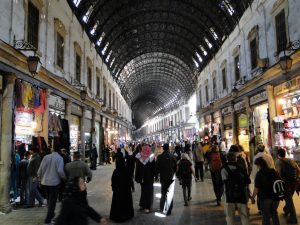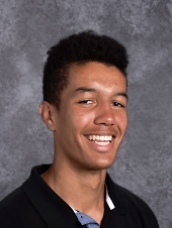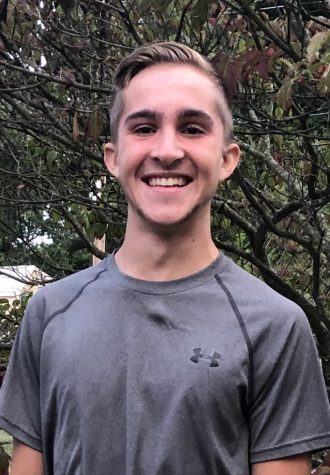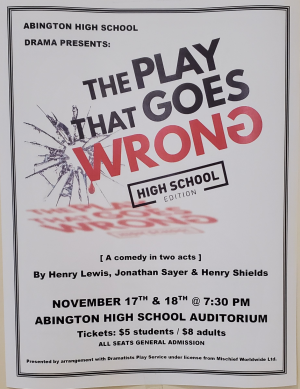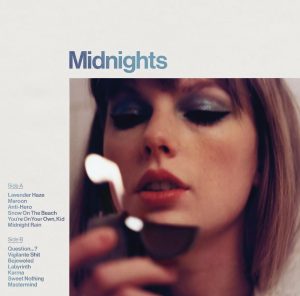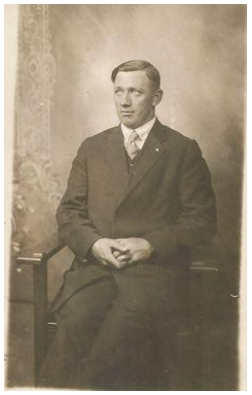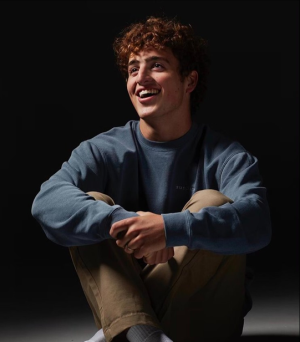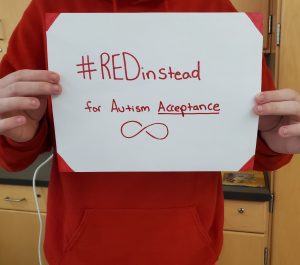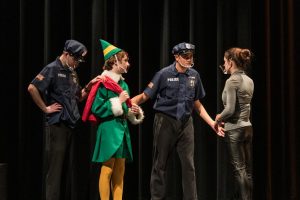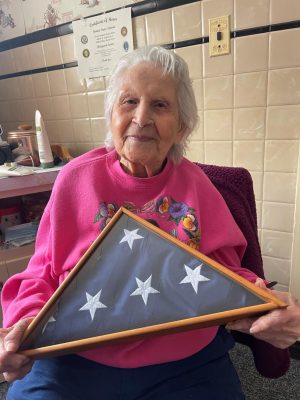Suitcase Stories Lands at AHS
Students and Storytellers Share Their Immigration Stories
November 26, 2019
On Oct. 25 in the Abington High School auditorium during Block 6, students were treated to the stories of those who immigrated to the America and currently live here. The sharing of their stories is through a program called Suitcase Stories.
Ms. Elizabeth Despres, the ESL teacher at the high school, brought the event to Abington because of its possibility for unity. She explains, “There is so much that connects us as humans. We’re so similar, even though some of us may come from different cultures and language backgrounds. That’s why I think it’s so important to show [this program to] many different people.”
The program started off with host Cheryl Hamilton introducing the three presenters who gave a brief anecdote from their immigration experience.
Those introduced included Anna Fletcher, an author, mother, plant grower, and Cuban refugee; Umeleni Mhlaba-Adebo, a writer, poet, mom, and musician; and Mackenzie Vieira, a writer and Curry College Biology major. Hamilton then went on to introduce three Abington High students: senior Shaam Nasser; sophomore Haekela Haraujo; and freshman Stephany Alfaro.
Mhlaba-Abedo was the first to share her story. She discussed her mother and her green thumb. Regarding her mother, Mhlaba-Abedo said, “Perhaps it’s because she grew up on a farm, or perhaps because she has the ability to give life to anything she touches, always in the back of the car is a box of flowers.” She continued by explaining how her mother brought her to life and her experience with how her mother allowed her to grow into someone who found success in America and subsequently the arts.
Cuban immigrant Anna Fletcher then shared her experience of coming from a poor, close-knit yet slowly disappearing, Cuban community in November of 1967. She described the difficulties her family faced as a result of the Batista revolution and her family’s attempts at fleeing the island. She said that as a six year old, “like most working class families, in the 50’s they [parents] wanted an end to the Batista dictatorship.”
Fletcher’s family would make it to the US, ultimately landing in New Hampshire. That is where she spent the majority of her life. There she discovered the lesson she would leave the audience. People she knew in Cuba would consistently send letters to those living in the states. As an adult, Fletcher would read them. They reminded her of home and the experiences her family was fleeing from. Fletcher remembers many of the old women she left in Cuba and the lessons they gave her. She said, “The old women don’t even really say much in their letters. Maybe a baby was born, an old man died, or something funny happened at the bus stop. But even though those messages seem mild, I hear an unwritten message in those letters, hazte valiente, make yourself brave.”
Vierra was the last of the three main presenters. She told the story of growing up in a family that did not support her love for the traditionally masculine automotive industry. She told about her experience during her first few weeks in high school automotive shop. “The smell of the emissions, the grease under my fingertips, learning with my hands. It just felt like home to me.”
She called her dad on her way home to tell him she thought she found her passion, and he told her, “No.” Vierra replied, “what do you mean No? I think I really like automotive.” Her dad told her, “I don’t want that for you.”
What Vierra eventually realized was that her dad and eventually her uncles did not want her to pursue a job with low job mobility. Her uncle nagged, “What are you talking about? Women don’t work in the garage. That’s a man’s job.” Vierra said, “I can’t tell you the amount of times I heard that.” But she didn’t let their discouragement stop her. She concluded by telling the audience to “Always follow your passion.”
The program finished with the AHS students. Haraujo shared how she experienced and ultimately conquered difficulty. “When I was three years old, the US Marshals came to my house and arrested my dad. Then he had to stay in jail for three years. Then he was deported. We lived in Brazil for eight years. We lost everything we had here. We came back four years ago, and I had to learn English. It’s not something easy to do, but I did it.”
Alfaro described her challenges of being the only Spanish speaker in her previous school. She said, “When I moved back here, no one else spoke Spanish. My uncles always said I was not going to be able to learn English, and that my first language was Spanish and I should stick with it. But then I did [learn English].”
Nasser shared the story of her journey. Born in the US, she then headed to Syria where her family is from, and then back to the US. Along the way she dealt with Islamophobia and ignorance. She said, “ Not everyone from the Middle East is a terrorist.” She went on to describe the discomforts associated with arriving in a new place. “People would ask me dumb questions like did I sleep in my headscarf? Did I shower in it? And they would always touch it.”
Because of the harsh political climate right now, a lot of hate speech is being spread. It was brave of Abington students to speak up about their experiences. It was also informative of the outside speakers of “Suitcase Stories” to cut through today’s negative speech, showing that people who have immigrated to the United States have stories that need to be heard.
The event concluded with Hamilton, who has been working with immigrants for twenty years, saying, “We created suitcase stories because we know storytelling is the fastest way to connect people. I think that particularly in the media right now, the stories tend to be the same narrative over and over again, but it doesn’t represent the complexities and diversity of actual voices. So the more we can identify and raise the profile of people, from an eight year old to a ninety six year old, the more we create authentic community.”
You can find out more about suitcase stories at: https://suitcasestories.org

